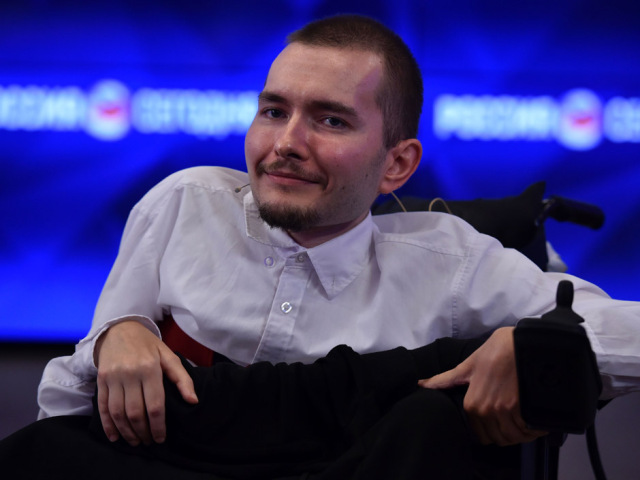Having fallen head over heels in love, the first volunteer for a human head/body transplant has pulled out, saying he could not leave his new wife and baby boy for the months that surgery surely would have required.
Valery Spiridonov, a 33-year-old Russian computer scientist who suffers from a devastating muscle wasting disease that has left his body compressed like an accordion, had signed on as the first volunteer for HEAVEN, or the “head anastomosis project” led by Sergio Canavero. The flamboyant Italian neurosurgeon has repeatedly vowed to one day oversee the decapitation of the healthy head of one man and its transplantation onto the surgically beheaded body of another.
“I cannot wait for surgery forever and my condition seems stable,” Spiridonov told Good Morning Britain on Tuesday from Florida, where he now lives with his wife, Anastasia, and five-month-old son. “I’m happy to say I’m married and I have a beautiful kid now and I’m in charge of my own company.”
Canavero’s collaborators in the ethically dubious — and, to some, morally repugnant — head-grafting venture include Xiaoping Ren, of Harbin University in China. Canavero moved his research to China after his home university in Turin rescinded his contract.

In an interview with the National Post in 2016, Canavero said Spiridonov was “absolutely committed” to surgery. “Here you have a patient who is dying, dying, dying every single day. What is going to happen if I do nothing?”
Now his former Russian patient says plans have changed.
“I’ve got my own things to do,” Spiridonov said. “In my life appeared a woman who I fell in love with.”
Canavero reports he has moved HEAVEN out of China and that the research is now unfolding elsewhere (he won’t say where) and Ren, for his part, insists all he really wants to do is fix damaged spinal cords, and not necessarily a full head/body transplant.
“Depending on the medical communities in the world, if we get permission in the future, of course I am still interested to do HT (head transplant) anywhere in the globe,” Ren said in an email to the Post Tuesday.

For now, his focus is on testing a special “fusogen,” a waxy, glue-like substance the researchers claim to have used to help monkeys and dogs with severed spinal cords walk again by cutting out the most damaged portions and reconnecting the two fresh ends.
Canavero said through an assistant on Tuesday that Spiridonov was never a candidate for a body swap in China, “for obvious cosmetic reasons.”
“Mr. Spiridonov acted as the poster boy of HEAVEN and, as such contributed immensely to the cause,” the email from Canavero’s office said. “He would have been a candidate in Russia, had the local government green lighted the procedure.”
Still, the list of volunteers, Canavero’s people assured, remains “quite long” and the work on HEAVEN continues.
Canavero and Ren have published ghoulish accounts of experiments that involved transplanting the heads of small donor rats onto the necks of bigger, recipient rats, though, as Cardiff University neuroscientist Dean Burnett once noted in The Guardian, exactly how giving a rat two heads counts as a “transplant” is anyone’s guess. The researchers have also published photos of a monkey with a neck scar, claiming they are proof of a full head transplant.
Two years ago, Canavero reported at a press conference in Vienna that a surgical team led by Ren had transferred a head from one human cadaver and connected it to the body of another in an 18-hour operation.
Ethicists have said there is every risk the first volunteer of any attempted head/body switch could end up demented, or dead.
Emory University bioethicist Paul Root Wolpe has argued that intentionally decapitating the head of one person in the hope of transplanting it on to the body of another also “walks a fine line between medical care and murder should the attempt fail.”
“They haven’t done enough animal studies to persuade anyone that they actually know what they are doing,” bioethicist Arthur Caplan, of New York University Langone Medical Center said Tuesday. “It’s sort of a long, endless publicity tour.”
In the wake of the recent gene-edited babies scandal, the Chinese government is also much more alert “to the reputation damage that renegade science can do,” Caplan said. If not in Russia or China, “it isn’t clear what country with the scientific and medical capabilities could do it. It would take hundreds of people to pull this off.”
National Post
• Email: skirkey@postmedia.com | Twitter: sharon_kirkey
